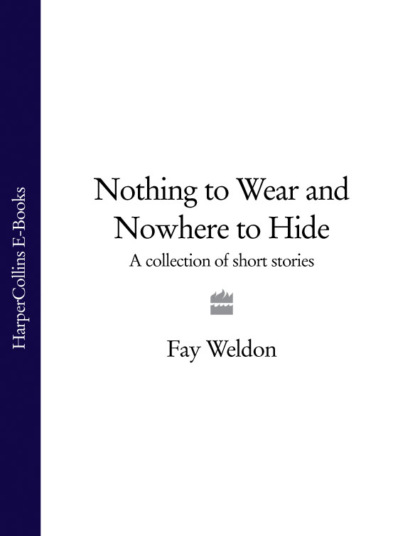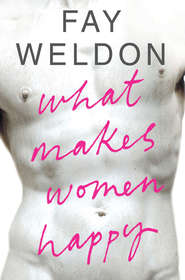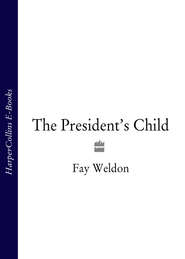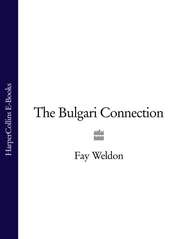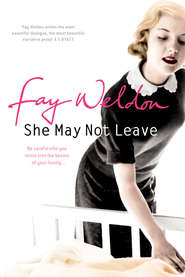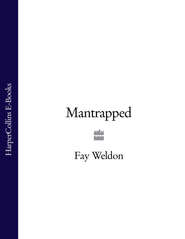По всем вопросам обращайтесь на: info@litportal.ru
(©) 2003-2024.
✖
Nothing to Wear and Nowhere to Hide: A Collection of Short Stories
Настройки чтения
Размер шрифта
Высота строк
Поля
‘You can’t do this,’ said Pam.
‘Yes we can,’ I said. ‘Then they can give these bodies a decent burial and we can all get some peace and some sleep.’
I bent down and picked out of the grave what looked like a sliver of wood, or had once been wood, in a blackened kind of way. And I gave it to Carter Wainwright and he put it in his pocket.
‘Give it the trace of a wooden frame,’ I said, ‘just to confuse the issue.’
I noticed my blistered fingers were getting better. Touch had been quite painful and cooking the children’s chicken dinner had been hell. Carter Wainwright came back with me for the books and a certain amount of canoodling did take place, I must say, before he took his leave. I didn’t want to be a burden to my children: a silversmith and a sculptor could live fairly amicably together. And he swore his name was truly Carter Wainwright and I believed him.
In the morning my back was better and my fingers unblistered and smooth. This is what a little sex can do for you, I concluded. And amazingly, it started to rain. You could practically see the lettuces breathe the moisture in, and their hearts swell and curl and firm. All the animals went out into the wet, which was rather unusual for them, and skittered about in pleasure. The ground was parched, how it drank in the rain.
I went down to the site with the children. Now that there were news teams and cameras and journalists with notebooks, they took more interest. Apparently a Christian cross, a Chi Rho, made of silver and wood, had been found in the grave of one of the centurions. They reckoned the sudden rain had loosened the earth, which was why they hadn’t seen it before. No-one had expected rain; it certainly hadn’t been forecast, and it was only local.
Harrison Ford from Nottingham was in a foul mood. This was the last thing he had wanted. Pam reckoned he was on some sort of performance bonus. He was in conference with his friend from Riley management, Marcus Dubiddy; I saw the Chi Rho lying on a piece of plastic by the grave while they argued. Both men looked thoroughly cross.
The rain had stopped pelting and now drifted in a kind of warm gentle misty shroud over the site. Those of us in jeans and T-shirts were at an advantage over the suits, whose ties began to look flabby very quickly. My son Joel even consented to join the dustpan and brush brigade, volunteers rounded up locally to help the Birmingham students sieve the ribboned-off sections of the site. They had at least five minutes’ training before setting to. At least there was stuff to find: oyster shells, bits of metal and broken Samian ware, all of which were being catalogued, plastic-bagged,and logged. Faster, faster, urged the overseers. They must cover more ground, more quickly. I felt protective of him, as if he were being whipped to build a pyramid.
Joel eavesdropped on Dubiddy’s conversation—I had been marked out as a troublemaker. The Chi Rho was to be sent by courier to the British Museum and they’d date it as a matter of urgency, and value it.
I must admit we panicked, Carter, Pam, Susie and I. We were to be discovered. The silver would be traced back to Carter: my involvement would be suspected. We had forged an early Christian cross. They would think it was some elaborate plan to make money out of the tourist trade. They would not believe our motives. Who nowadays would put themselves out to get a few old dry bones a Christian burial?
We drank too much Chilean red that night, round at my place, to quell our nerves and celebrate the removal of the triptych to Canterbury Cathedral. The carriers had come that day. The more we thought about it the more delinquent our forgery seemed, and indeed impertinent. The Roman legions came from all over the world: the centurion could have belonged to any of a dozen faiths. Many worshipped Mithras, the Sun God. Susie said she didn’t think he was a Mithraic, see, it was still gently raining; surely Mithras would have honoured his own? It was fine enough over the rest of the country: only our graves dwelt in this gentle, moist, life-giving Christian mist.
Matt, usually so wary of Pam, for his sort and her sort do not usually agree, came up and drank with us, and they told each other jokes. Susie became quite pink and giggled: Carter decided he had fallen in love with me; the children persuaded me to take in a stray cat who kept trying to live with us, while I tried to let her know, tactfully and firmly, that it was not to be. That night there was a terrific thunderstorm and lightning struck the village shop. The postmistress said it was the spirits of the unburied dead up there on the site bringing bad luck.
The British Museum sent an e-mail to Harrison’s laptop the next day. The Chi Ro was genuine. Two thousand years old, give or take a decade or two. Riley’s put out a press release. Carter was beside himself with pleasure. Not only had he had found me but he was one of the greatest forgers alive.
The next day the press turned up in force. Priceless, or at any rate in the region of several million pounds. We could say nothing, and we had won nothing. It was too late. Riley’s put guards on the site and strung a barbed wire fence around it. But still the bones were to go to Birmingham the next day. And within hours after that the skimming would continue and the vast screed would be laid, and that would be the end of our history, not to mention the nesting sites of the greater crested warbler, et cetera.
Then a Canon from Canterbury rang me to congratulate me on the triptych, and I think he meant it. I bought up the matter of the graves.
‘If they’ve found a Chi Rho in a Roman soldier’s grave,’ I said, ‘and the British Museum has validated it, then can’t we just accept that the dead soldier is a Christian? Sure, he might have stolen the cross, but for that matter he could have been present at the Crucifixion.’
It was amazing with what equanimity I could lie. I put it down to being in love. The Canon hummed and hawed and then all of a sudden cheered up, and said of course. He would be happy to do some kind of service of reconciliation, before the bones were bagged. He’d get through to the Rumer parish priest. I said they’d have to be quick. He said the Church could be if it had to be.
And sure enough early the next morning, while a restive Harrison Ford and his team stood back, and the JCBs stood silhouetted against the skyline with the young sun behind them—the storm had cleared the air—the knitting women set up a trestle table with a white cloth and a pot of wild flowers on it: and the Canon, an eagle of a man, turned up in his little Volkswagen, even bringing with him a Bishop from a neighbouring diocese—he had his crook with him and his gold embroidered over-vests, or whatever they’re called, in the back seat, and all those concerned and interested turned up, and a few journalists as well.
And the priests performed a service of reconciliation: and we sang a few quavery hymns, lost on the breeze—O God our help in ages past—then the table was folded, and the altar cloths, and we drifted off, and peace descended on the valley. All of a sudden it was a place like anywhere else.
Then Harrison and his team darted in like a team of vultures to take their pickings away, and their vans moved off. The JCBs surged down the hill to get to the part of the site they’d been denied, and a hundred cement mixers queued up on the new roads waiting to get in. Goodbye, marsh pippin, goodbye. The future knocks on the door, and if you don’t let it in, it simply batters it down.
But peace and prosperity has descended upon Rumer as if it were blessed: visitors come from all over the world to see the knitted patchwork tapestry, which won an international art prize and now hangs behind the altar, instead of being auctioned. To our relief the mall traffic was rerouted away from the village: a free bus service runs three times a week there and back for those without cars. Our flowers win at Chelsea: we grew a record carrot and its photograph was in the Mail. We keep the post office and the village store, and the little school was even reopened: the young stay instead of going off to the big city: why live away from paradise?
As for the mall itself, that prospered mightily. The fruit was always fresh and the bread stayed cheap. The charity shops were given concessions. The Internet cafée sopped up the alienated young and has given them purpose and achievement. Becky Horrocks took up computer studies. Matt was promoted to crime prevention officer and could work locally, to Susie’s pleasure. The mall even boasted a little museum, endowed by Riley’s and the University of Birmingham, where you could see photographs of the site, and the outline of the villa and the graveyard, and a replica of the Rumer Cross. I could not find out what happened to the original. It was probably bought by Bill Gates or Steven Spielberg to enrich their collections.
I married Carter Wainwright (in church, of course). My hands stay smooth and strong the better to continue to work. So do his. We are both employed these days doing restoration work, mostly for cathedrals. Carter replaces stolen silver plate (there’s a lot of that to do) and I forge, fashion and bake metal, stone and clay, making good whatever the weather undoes.
We don’t say it to each other, but we can both see in retrospect that what was going on at the site was miraculous, outside the normal order of things. It would not surprise me if it were indeed a sliver of the true cross I picked up that day and which Carter worked with: and that it leaves its blessed traces behind. I think we will be forgiven for our deceit: we were meant to do what we did.
THE DEVIOUS AND DELECTABLE (#ulink_b06fba4c-e84a-57fd-b755-eddc1053d992)
A Summer Person (#ulink_9f73a03f-4719-5449-960d-c205e87d8b0d)
I’m a summer person, and she’s a winter person. Her name is Jennifer, mine is Kate. She’s twenty-five and I’m twenty-four. She used to be my best friend. Now she’s my father’s girlfriend, and soon he’ll marry her, once he’s divorced my mother. Then she’ll be my stepmother. We’re all good friends. These things have to be done amicably, for the sake of the children: that is to say me. My mother and I are in therapy, and dealing with our negative emotions very well, but the other two don’t seem to need it.
Jennifer and I were at college together. We’ve known each other since we were fifteen. Now we both work at the same travel magazine, going all over the world trying out holiday destinations for our readers, which is a pretty terrific kind of job. We earn well and travel well, and we’re both ambitious: I even got promotion to deputy editor recently, and Jennifer was happy for me, or seemed to be. She is, was, my best friend.
When I say she’s a winter person I mean she’s very fair and delicate-skinned, and burns easily, and likes to stay out of the sun. If she’s in it too much she goes red in the face and sweats. She’s the Iceland expert at the magazine. She goes for the cold destinations whenever she can: mountains and glaciers: I go for the hot places, lying around on beaches. If a mosquito bites her neck her whole face swells up, and her eyes go tiny, red and puffy so she can hardly see out of them. She gets hay fever and sneezes a lot in the pollen season, and has to dose herself with so much histamine she hardly makes sense when she talks.
But she looks fantastic at a Christmas party, her skin pale and almost translucent, her eyes big and haunted, and the blonde bob fragrant and silky, and wearing cashmere so pale pink it’s almost white. Wrap her in a winter coat and she looks sexy and vulnerable.
Me, I bloom in the summer. I have an olive skin and tan easily and love lying in the sun. I am at home on a beach and have a bikini figure—long-waisted and athletic. My hair is very thick and curly, and at its best looking as if it’s just been dunked in the washbasin and left to dry in a hot wind, as befits Nature Girl. I shiver all winter and get goose-pimply, eat too much chocolate and get spots, and put me in a winter coat and I look like a sausage wrapped round the middle with a piece of string. I like high heels, but they’re not good on ice.
Вы ознакомились с фрагментом книги.
Приобретайте полный текст книги у нашего партнера:
Приобретайте полный текст книги у нашего партнера:





